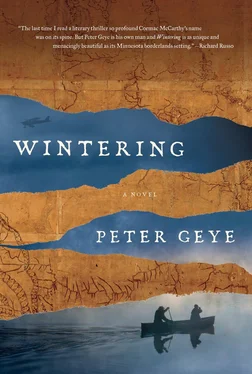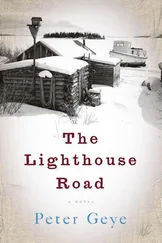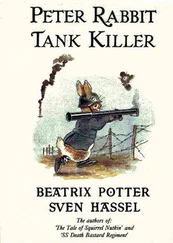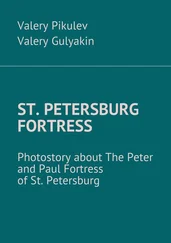That expression is the one he always wore in public when I was around, which is why most of our time was spent in private, mostly nights here, at my house by the river. We’d have dinner together. Play cribbage by the fire, sipping Harry’s aquavit. All our time together felt stolen, clandestine. It did then, and does even more so now. That would be troubling enough, but now there’s this: All of those nights together — some thirty years of them — have dissolved into one. Or what I remember as one. Time is already doing its job.
Thank goodness for the photograph. It seems to be almost like evidence that we were together. I studied it closely that morning and realized that our love was in its final act. I’d spent nearly as much time waiting for him as I had with him, and now he was gone. But how would the rest of it go, without Harry here to be a part of it? Or part of it only in my memory — what there was of it — and in the stories his son was telling me?
I stood at the bureau for a long time, looking at us. When I could bear it no longer, I turned my gaze out the window, at the river curling into the trees and rocks. I stared at the river for many minutes. As I did, my reflection came into relief on the glass, and I saw my face suspended over the river. Crying. I hadn’t even noticed I was. And I thought of Harry crying into the snow.
Had it been necessary for him to go into the borderlands, for the two of them to have gotten lost up there, so that we might be together? Did the moment when he finally came to me depend on all that had happened up there? And if so, what did that say about our love?
AFTER THAT MORNING in the swamp — under the falling snow, with Harry’s weeping — came a week of days and nights surrendered completely to the wilderness.
Each morning broke in fog, and Harry and Gus decamped in silence. Always in silence. Harry was no longer checking the maps. They hardly ever spoke. The sound of their paddles scooping through the water was symphonic.
The first of those mornings they canoed across a shallow lake and found a stand of spruce. The trees were draped with old-man’s beard that hung white, covered with the morning’s frost. Gus passed beneath them thinking that ghosts guarded the world, and he felt all the safer for it.
They paddled streams that turned to swamps and back again to streams without giving up their currents, without a tree in sight above the brown reeds. On the smaller lakes, even the water lilies had gone brown alongshore. When they found the woods again, the only green thing left among them was the lichen and moss. The pines had gone to black against the wan light.
Another morning they woke on a beach, and when Gus walked around the curve of the shore for a piss, he found a riot of paw prints in the sand. He followed them to where they ended in bloodstains and the wolves whose tracks they were had caught their prey. A deer’s four hooves was all that remained.
They portaged through woods and on trails and over granite ridges that had been fractured. Crossing one of them, Harry said, “Wasn’t that last cold snap these rocks could no longer stand. No, sir, the cold that busted them came a thousand years ago.”
It was the first thing he’d said that day.
Each morning came later, each evening sooner. The moon rose after dark, low and bulbous through the trees, as golden as if it had been dipped in bourbon. The sun rose in turn the next morning and provided as little light or warmth as the moon it replaced.
They slept under their tent with a fire burning at the open end of the canvas. Some nights they’d spoon together for the body heat. It snowed twice overnight. On starry nights, Gus could see his father’s sleeping face as though it were in broad daylight. Harry slept untroubled, which troubled his son greatly.
There were log-jammed creeks where the water had stopped altogether, only to rise again as if from the soil itself a quarter mile down the streambed.
The stands of aspen and birch were white as bones.
And one day’s walk was through burnt-over timber. Miles of black, and only the white clouds above to break it. Their boots were coal-black when they took them off that night. “I guess it’s the devil’s stand of timber we crossed today, eh, bud?”
Gus couldn’t shake the blackness from his mind. “I guess it’s all the devil’s timber up here.”
Harry laughed out loud and said, “Good thing we don’t go in for that hocus-pocus!”
It was the last thing he said until days later. The birds were all gone. There were no chirping insects. No rustling leaves left on the trees. Gus found conversation with their snapping campfires at night instead.
The last of those nights he woke with a start. Their fire had died and his teeth were chattering, and when he stepped out of the tent to restoke the flames, he saw the pines on the opposite shore backlit by their own celestial fires: the aurora borealis, shimmering orange and red across the starlit heavens.
Surely, he thought, there was a way to burn with them.
THEY PADDLED through the morning and past lunchtime and still there was no end to the lake. Now the wind was stiff in their faces, the sun falling over their port shoulders. Gus looked toward the shore. He felt like they were being watched.
The cliffs and skerries they’d left behind that morning had given over to drab rolling hills. Between their aimlessness and the difficult paddling and their general and persistent silence, they had not yet spoken that day.
Gus, trying to change the subject in his mind, finally said, “Think we’re in Minnesota or Canada?”
“It doesn’t matter.”
“I’m hungry.” Gus nearly had to shout to get his voice above the wind.
“Eat some jerky.”
“I want a steak.”
“A steak?”
“And some spuds.”
“You’ll need a beer, then. And a crock of corn. While we’re at it, how about a slice of rhubarb pie for dessert?”
“And a gallon of strong black coffee.”
Harry looked ahead. “The coffee I could give you,” he said.
Their canoes drifted together and they both idly surveyed the lake.
“Dad, what are we going to do?”
“We’ll paddle until we find a campsite.” Harry dipped the tin cup he’d tied to the canoe’s thwart into the lake and brought it up for a drink.
“The sun’s gonna set in an hour.”
“Then we ought to quit lollygagging.” He dipped his cup for another drink and took up his paddle again.
“We’re in real trouble, aren’t we?” Gus said, and though he’d felt the certainty of this for some time, saying it aloud made it entirely more bothersome.
“We don’t know trouble yet.” Harry nudged his son’s canoe away. “Hell, we haven’t even met trouble’s third cousin.”
It was no relief for Gus to hear his father’s voice after so many days of its absence.
—
An hour later the shore to their right opened into a bay bulwarked by a beaver lodge. They paddled ahead as the sun settled behind them. The calm water was an improvement over going hard against the relentless wind.
Harry said, “There’ll be someplace to pitch our tent on this bay.”
“I thought the same thing.”
Gus scanned the shoreline. The forest stood in ranks. Cedar trees on the far shore, letting into a shadowy muskeg. Birch trees behind them. Maples ahead. Tall, rugged white pines where they steered their canoes.
“That could be rice over there.” Harry pointed the tip of his paddle toward the cedars. “I used to do some ricing with my old man and Mr. Riverfish. I bet I could dust the cobwebs off the old brainbox and harvest us some. It’s about the right season, if I recall.”
Читать дальше












